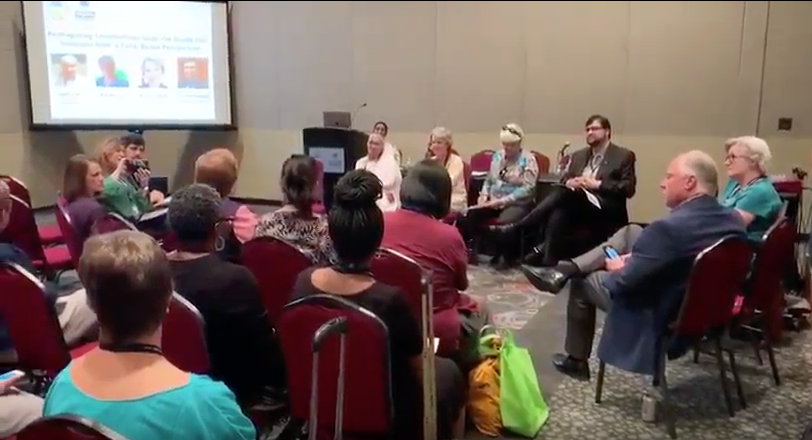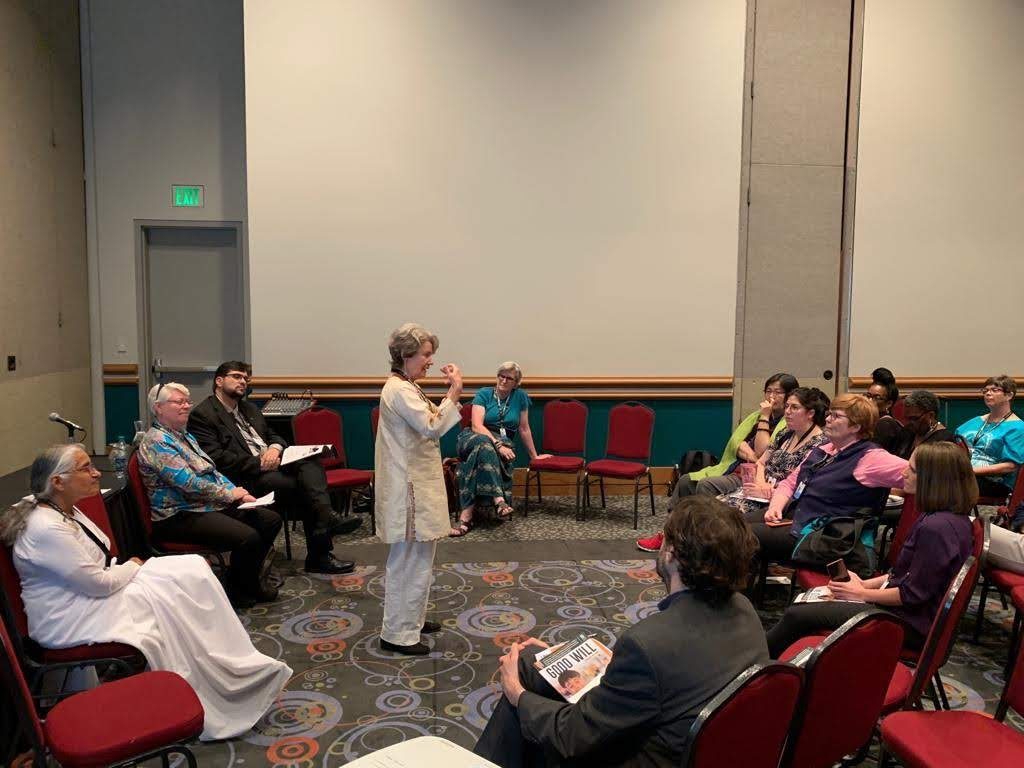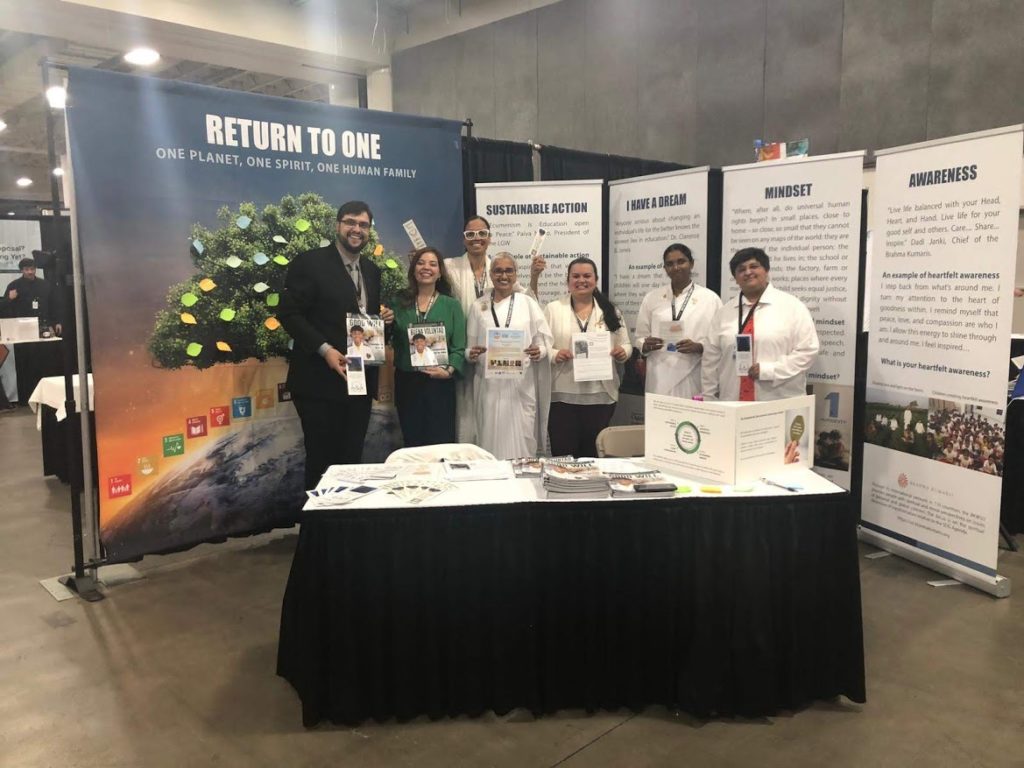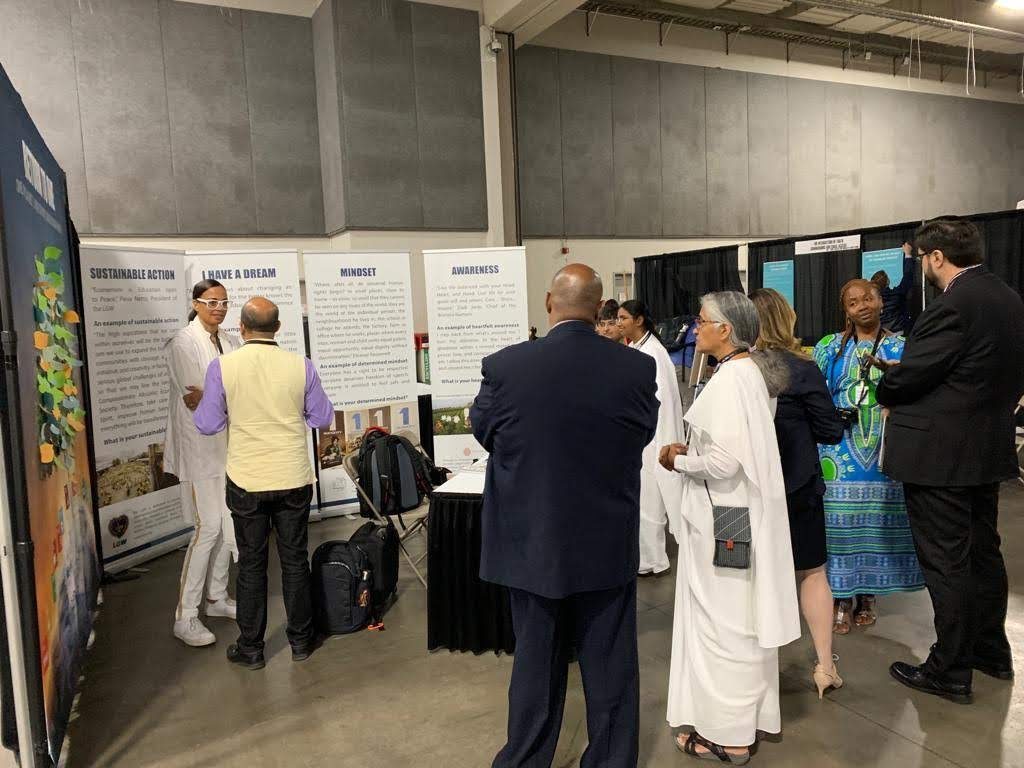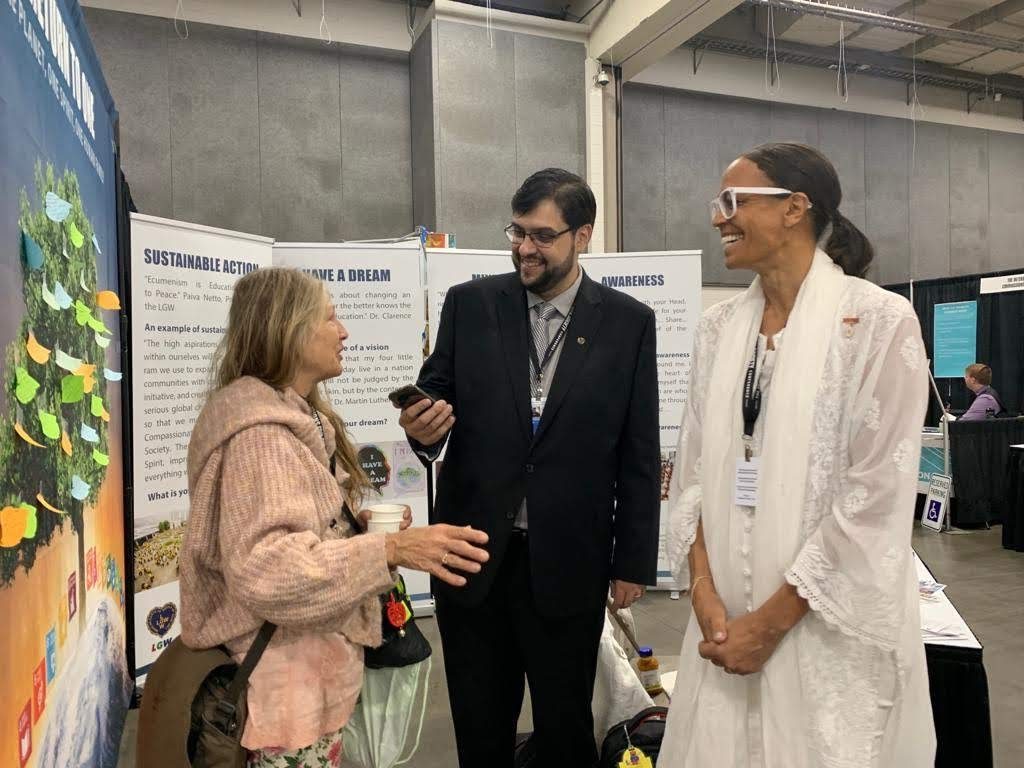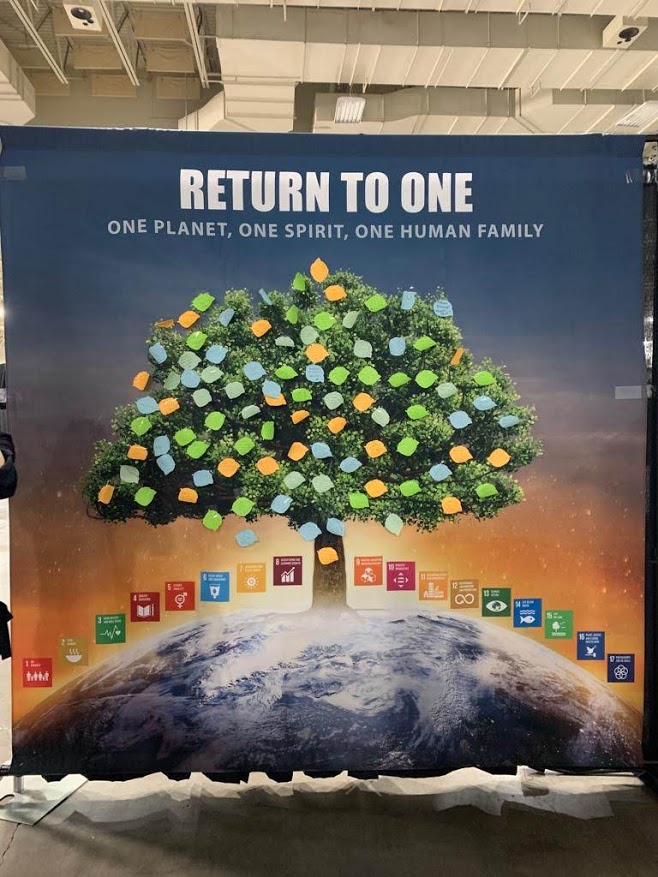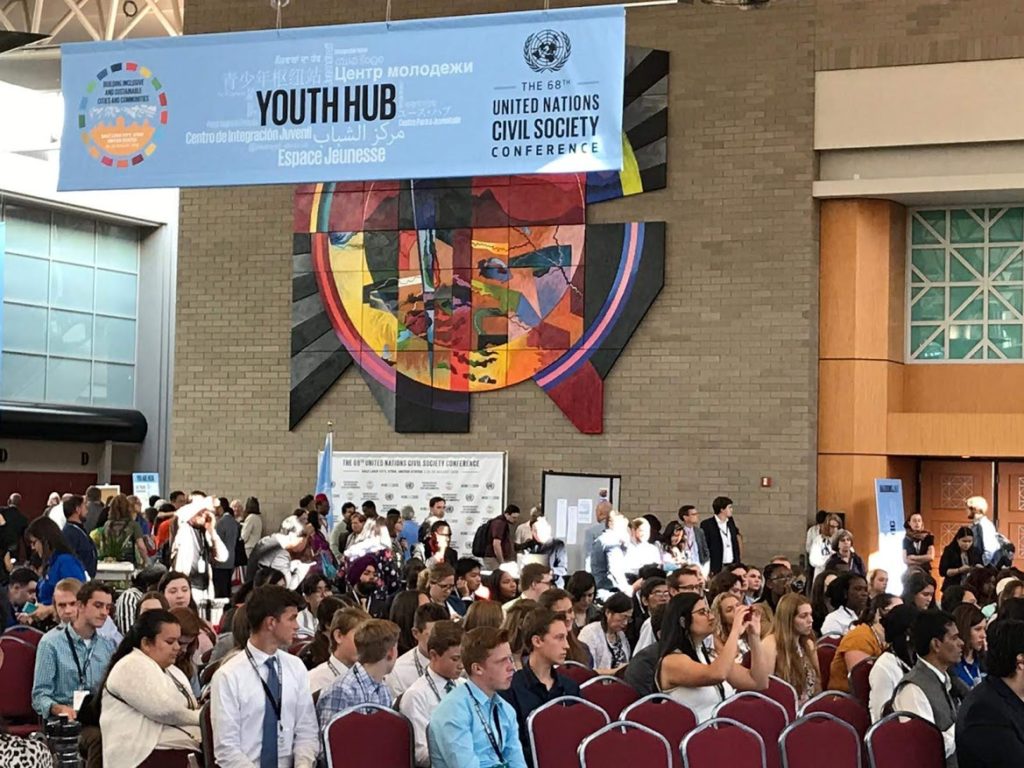Salt Lake City, Utah ( USA ): About 5,000 participants from over 100 countries attended the annual UN NGO conference held in Salt Lake City (SLC) in the magnificent Salt Palace Convention Center. A delegation of five represented the Brahma Kumaris at the conference: Kinnari Murthy MD, Nik Lal, Sabita Geer, Shivani Dayal, and Valerie Still.
The Brahma Kumaris co-organized two events – a workshop and an exhibit.
The Workshop was on the topic “Re-imaging Communities from the Inside Out: Solutions from a Faith-based Perspective” for which BK Sabita Geer, Beth Blissman, and Danilo Parmegiani were the speakers and the moderator was Martha Gallahue.
The goals of this workshop were to 1) understand a broader concept of sustainability and how to effect this change with a spiritual and values-based injection and to 2) look at ways in which faith- and values-based organizations can contribute to providing a solid foundation, teaching people compassion and respect for themselves and others. The manifestation of these goals was an interesting and engaging conversation among faith and non-faith leaders. The workshop offered a platform for faith traditions to come together, sit down, and look inward for answers and sustainable solutions to their community’s issues. A circle-setting fostered connectivity and interactivity and each one introducing themselves created inclusivity and allowed speakers to assess the various religions and beliefs present.
Each presenter shared the work of their respective faith while addressing the notion of an ‘inside-out approach’ in accomplishing their goals in areas such as sustainable education, women’s and girls’ empowerment, renewable energy, healthy lifestyle, sustainable transformation, and climate action.
BK Sabita Geer, UN Representative of the Brahma Kumaris, shared about Sustainable Yogic Agriculture which illustrates the impact of our thoughts on plants and the environment. She shared how the power of thought has been demonstrated by seeing the effect of positive thoughts on plant growth. Hundreds of farmers in India use this method, bringing amazing results and produce. This method of meditating while farming is not only eco-friendly but economical and easily sustainable. She also shared about the BK effort towards renewable energy resources. The India One Solar Thermal Plant, based in the BK headquarters in India, provides electricity for up to 25,000 people, including cooking three meals per day. The thermal plant was built with many partnerships, but really highlighted the ingenuity of Indian engineers who determined how to adapt solar disks to the desert climate of Rajasthan.
Reference was also made to the founder of the Brahma Kumaris who saw the need for women to be leaders and decision-makers. He thereby inspired them to recognize their self-worth and live their life coming from that inner space of goodness. The result of this is the leadership of the Brahma Kumaris in about 110 countries, resulting in the largest spiritual organization run by women!
Danilo Parmegiani, ED, Legion of Good Will and UN Representative, shared about the development of a unique pedagogy that promotes Global Citizenship Education while providing access to basic services of social assistance across 210 cities and seven countries, especially in Latin America.
Beth Blissman Ph.D., UN Representative of Loretto Community, talked about how the organization works to promote peace and justice, creating a curriculum about the UN / SDGs to educate and empower girls, and exploring eldercare and sustainable farming.
Martha Gallahue, ECOSOC Representative of United Religions Initiative (URI), explained that URI is a grassroots organization whose mission is to promote interfaith harmony. Currently, there are 1,000 local circles in over 100 countries and the communications network is promoting multi-regional circles such as the URI-UN circle whose members come from all over the world.
In closing, BK Sabita reminded the gathering that love is the common ground within all religions and if leaders emphasize this within their congregation, barriers and limitations will fall apart, bringing us all together as ONE global family.
Martha Gallahue moderating the session. Each organization committed to an action plan:
Brahma Kumaris: strengthen the ‘awareness to action’ approach individually and collectively to achieve sustainable transformation and the SDGs.
United Religions Initiative: continue to build upon the Appreciative Inquiry model to promote trust and understanding in both contemplative and activist arenas.
Legion of Good Will: Empower and prepare new generations for a more just, altruistic, ecumenical and sustainable society for all.
Loretto Community: explore intentional community as an active pathway to lower carbon footprints, reconnect with nature and achieve the SDGs.
Return to One: One Planet, One Spirit, One Human Family Exhibit was co-organized by the Brahma Kumaris and the International Federation of Women in Legal Careers, the Dr. Clarence B. Jones Institute for Social Advocacy, and the Legion of Good Will.
For a conference focused on climate, inclusivity, and sustainability, it is unsurprising that people were drawn to the magnificent tree on display at the ‘Return to One’ exhibition booth. What may have surprised some participants, however, is that the booth was not solely focused on climate sustainability, but rather emphasized a much deeper sustenance of the self. This was demonstrated by the way the tree’s strong roots became entwined with the glowing earth below it, while the light of the sun shone behind in perfect synergy.
Titled, “Return to One: one planet, one spirit, one human family,” the esthetics of the beautiful tree along with four banners of the participating organizations was both powerful and elegant. Each organization highlighted its work on one of the four steps along the “Spiritual Trajectory”: awareness, mindset, dream, then sustainable action. The goal of the exhibit was to encourage participants to embark on the journey from awareness to sustainable action, and end by writing their commitment to action that would help bring unity to the world on leaf-shaped post-its, and stick it on the tree.
The booth attracted dozens of participants, including the local press, who walked through the reflective process. Some were able to pin their commitment on the tree within minutes, others made the decision to return to the booth later after some thought, which they did.
The tree began bare but by the end of the three days, it was covered in leaves representing Commitments to Action that included wanting to become educators, improving their household’s recycling, or joining local action committees.
The Brahma Kumaris recognizes that love is often the most radical and revolutionary act a human being can perform. Love is what bridges divides and reminds us of our humanity. It underpins all of the work NGOs were conducting and it is the fundamental approach the BKs take to all of their work. In many ways, the exhibit was about caring for the caregivers of the world, those working on a grassroots level, and restoring their faith in peace.
In a large warehouse of an exhibition hall, the energy from the “Return to One” exhibit created a warmth that brought people into a space where thoughts, intentions, and love were valued as crucial tools to achieve the UN’s SDGs.
The Brahma Kumaris were also interviewed by local TV stations: KSL News and Church of Jesus Christ of Latter-day Saints TV channel.


